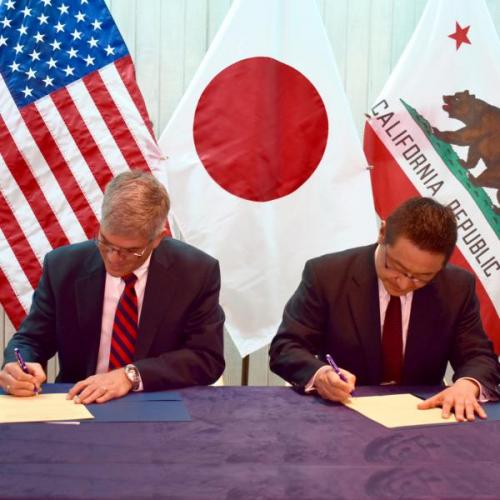
The University of California San Diego and Japan’s National Institute of Advanced Industrial Science and Technology (AIST) have forged a new, five-year pact to cooperate on research in the fields of computer science and technology.
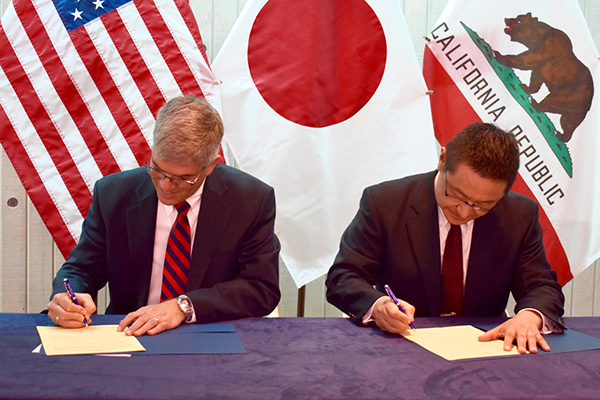
between UC San Diego and Japan's AIST national institute.
Photos by Teri Simas/PRAGMA
On January 10, representatives of both institutions signed an MOU, outlining some of the specific areas for potential collaboration. AIST was represented by Satoshi Sekiguchi, Director General of the Japanese institute’s Department of Information Technology and Human Factors. UC San Diego Executive Vice Chancellor Elizabeth H. Simmons pre-signed the non-binding MOU (because she was on travel), and at the ceremony San Diego Supercomputer Center (SDSC) Chief Technology Officer Philip Papadopoulos also signed on behalf of UC San Diego. The signing took place at the UC San Diego Faculty Club.
“We are building on a history of more than 15 years collaborating with AIST on specific projects,” said Papadopoulos, who is also an academic lecturer in the Computer Science and Engineering department.. “What has changed is that the MOU is expanding the partnership to other units across our university via a campus-wide agreement that will broaden an already close relationship between our two institutions.”
The MOU covers research, education and the application of scientific knowledge in the field of artificial intelligence (AI). This collaboration is also expected to extend into data-intensive science and robotics. Specific types of activities in the MOU include organizing workshops in fields of mutual interest in Japan and the U.S.; exchanges of AIST researchers with faculty and postdoctoral scholars from UC San Diego; and AIST hosting UC San Diego students to work on related research projects in Japan.
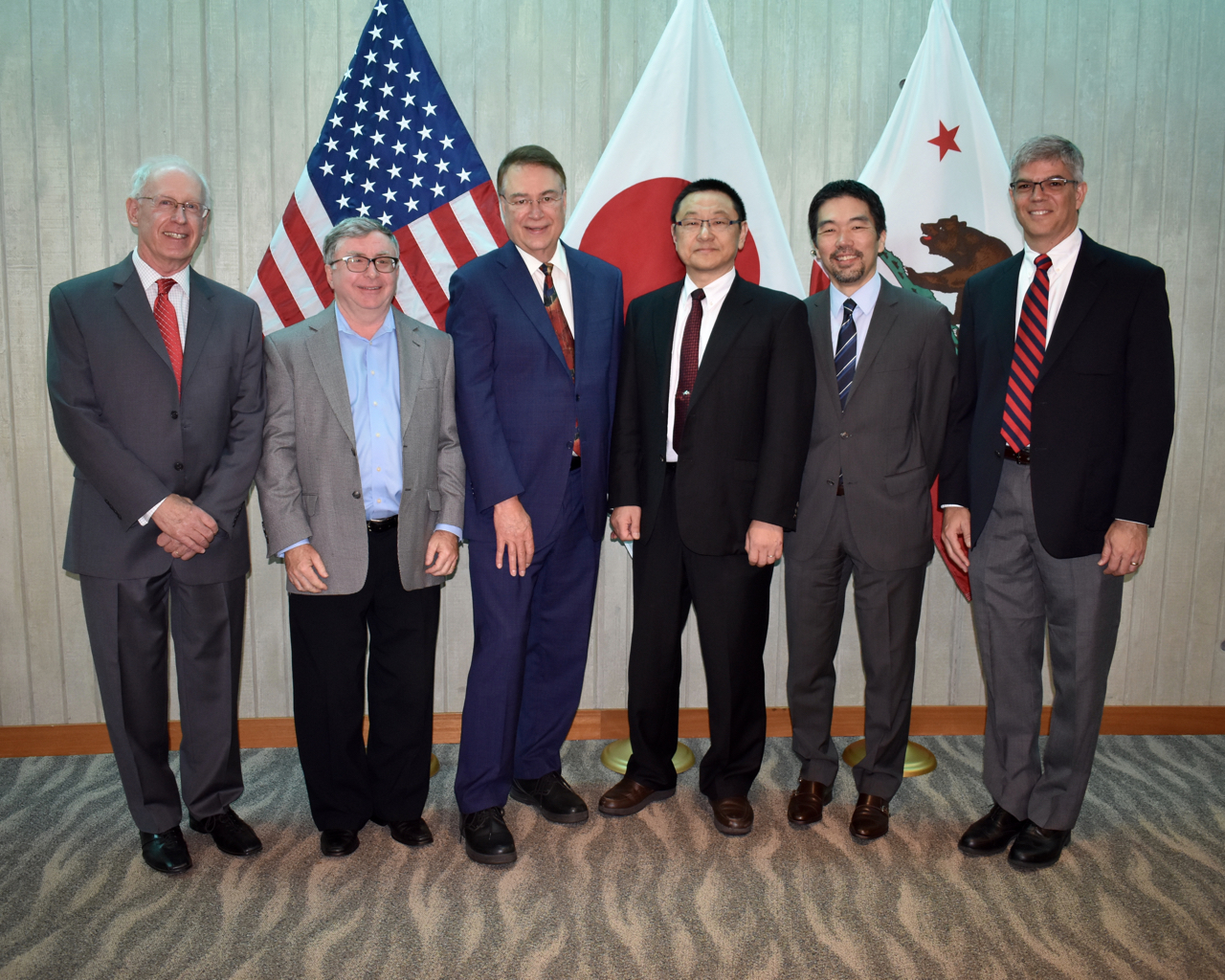
officials from UC San Diego and AIST after ceremony.
Pictured (l-r): Jeff Elman, SDSC director Michael Norman,
Larry Smarr, AIST's Satoshi Sekiguchi and Jason Haga,
and SDSC's Philip Papadopoulos.
The two sides will also collaborate on cyberinfrastructure projects, notably involving the UC San Diego-based and National Science Foundation-funded Pacific Research Platform (PRP) and Cognitive Hardware and Software Ecosystem Community Infrastructure (CHASE-CI), as well as AIST’s AI Bridging Cloud Infrastructure (ABCI). Both PRP and CHASE-CI are led by Calit2 Director Larry Smarr, who is also a professor of Computer Science and Engineering in UC San Diego’s Jacobs School of Engineering. PRP links more than 25 universities and other research institutions in the western U.S., while CHASE-CI’s 10 member research universities are deploying a cloud of affordable graphics processing units (GPUs) networked together with non-von Neumann architectures to facilitate development of next-generation cognitive computing.
“AIST has been an active collaborator with Calit2’s Qualcomm Institute from its inception,” said Smarr. “We look forward to this expanded framework for collaboration, and in particular, to deepening our collaboration on artificial intelligence and high-speed networking.”
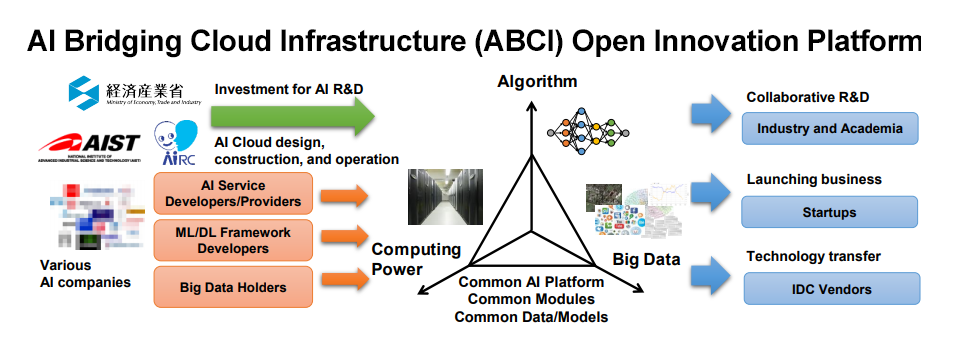
In addition, AIST and SDSC will be sharing best practices on complementary systems such as SDSC’s Comet petascale supercomputer which, like Japan’s ABCI, is a hybrid computing cluster.
Indeed, Japan’s ABCI facility – now under construction – will open in early fiscal 2018 on the Kashiwa II campus of the University of Tokyo. It is based on both GPUs and central processing units (CPUs).
“When it launches, ABCI will be the world’s first large-scale, open innovation platform for AI research and development and it will significantly accelerate AI deployment in the physical space,” said AIST’s Sekiguchi. “Using top-level, high-performance compute and data capabilities to achieve more than 550 Petaflops of computing power (at half precision), the ABCI platform integrates high-performance computing, big data, ultra-high bandwidth and low-latency hardware in a modern design to accelerate joint academic-industry research and development.”
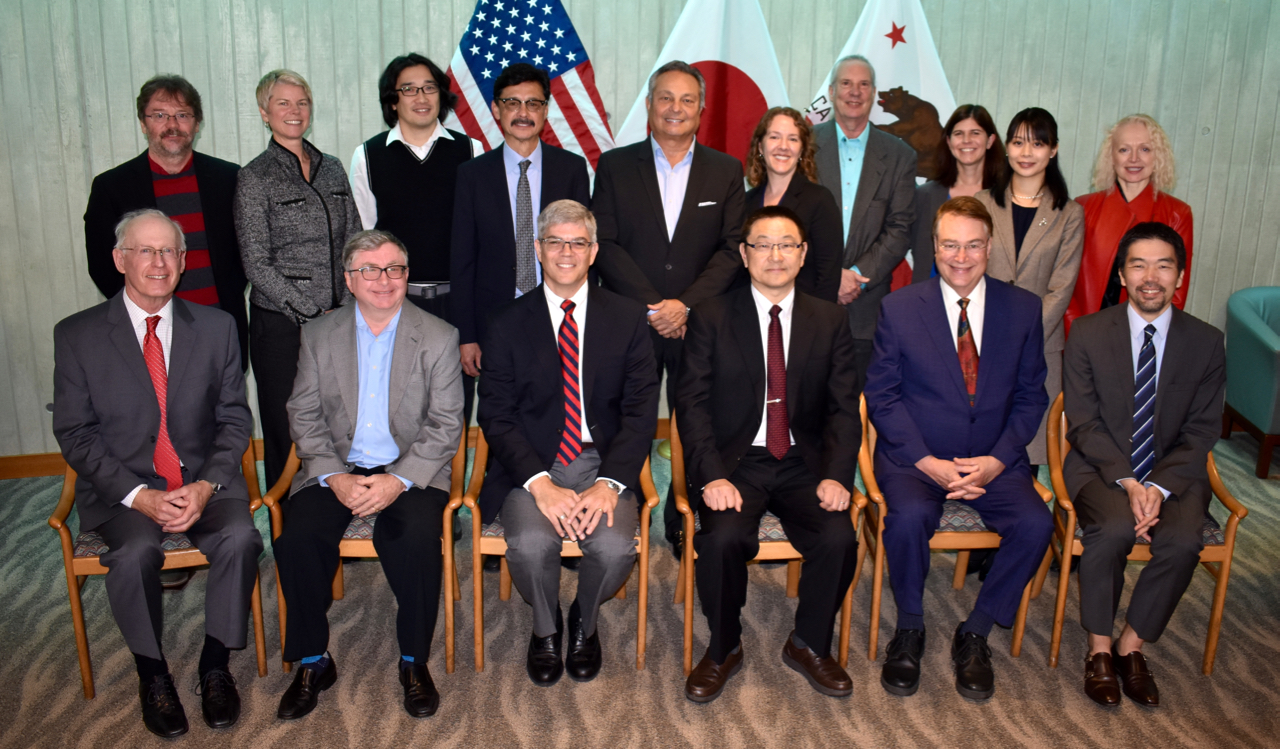
for group portrait after the MOU signing ceremony. Pictured
(clockwise from top left): Frank Wurthwein, Michelle
Hermas, Gerald Po, George Sugihara, Tom Tabor, Tiffany
Trader, Jan Zverina, Shava Smallen, Shoko Itoh, Nadya
Williams, Jason Haga, Larry Smarr, Satoshi Sekiguchi,
Philip Papadopoulos, Michael Norman, and Jeffrey Elman.
Japan’s Ministry of Economy, Trade and Industry is funding the acceleration of AI deployment with a grant of approximately $175 million (19.5 billion yen), which includes 5 billion yen for the ABCI facility.
AIST’s vision is to create a global partnership with UC San Diego and other Pacific Rim organizations. Under this MOU, AIST gains access to UC San Diego researchers and students who will bring new perspectives and knowledge, while UC San Diego benefits from access to ABCI's large-scale computational resources – giving university researchers the opportunity to perform data-intensive research for AI on an unprecedented scale.
Previously, AIST and UC San Diego worked together through UC San Diego’s Pacific Rim Application and Grid Middleware Assembly (PRAGMA) computer science research community to maintain services provided by AIST during the 2011 Tohoku Earthquake. PRAGMA – which is led by SDSC’s Papadopoulos – was established in 2002 with UC San Diego and AIST among its founding members. Through the long-term partnership described in the MOU, both organizations stand to benefit from joint research projects developed together in AI broadly, as well as in related fields. Together with UC San Diego, AIST aims to create a dynamic, innovative and exciting computer science research environment for the future.

